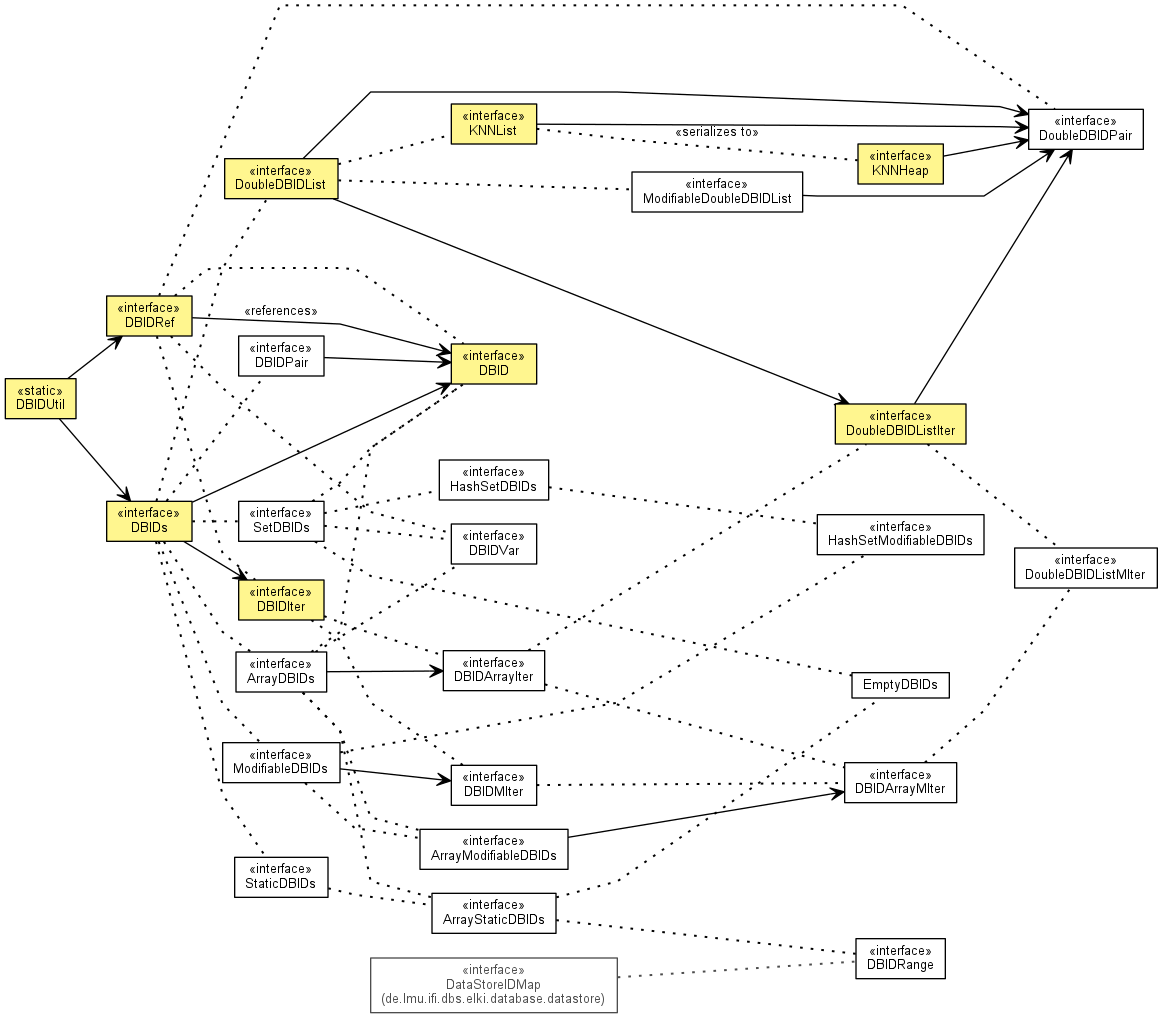
See: Description

| Interface | Description |
|---|---|
| ArrayDBIDs |
Interface for array based DBIDs.
|
| ArrayModifiableDBIDs |
Array-oriented implementation of a modifiable DBID collection.
|
| ArrayStaticDBIDs |
Unmodifiable, indexed DBIDs.
|
| DBID |
Database ID object.
|
| DBIDArrayIter |
Array iterators that can also go backwards and seek.
|
| DBIDArrayMIter |
Modifiable array iterator.
|
| DBIDFactory |
Factory interface for generating DBIDs.
|
| DBIDIter |
Iterator for DBIDs.
|
| DBIDMIter |
Modifiable DBID iterator.
|
| DBIDPair |
Immutable pair of two DBIDs.
|
| DBIDRange |
Static DBID range.
|
| DBIDRef |
Some object referencing a
DBID. |
| DBIDs |
Interface for a collection of database references (IDs).
|
| DBIDVar |
(Persistent) variable storing a DBID reference.
|
| DoubleDBIDList |
Collection of double values associated with objects.
|
| DoubleDBIDListIter |
Iterator over double-DBID pairs results.
|
| DoubleDBIDListMIter |
Modifiable DBIDList iterator.
|
| DoubleDBIDPair |
Pair of a double value and a DBID.
|
| HashSetDBIDs |
Hash-organized DBIDs
|
| HashSetModifiableDBIDs |
Set-oriented implementation of a modifiable DBID collection.
|
| KNNHeap |
Interface for kNN heaps.
|
| KNNList |
Interface for kNN results.
|
| ModifiableDBIDs |
Interface for a generic modifiable DBID collection.
|
| ModifiableDoubleDBIDList |
Modifiable API for Distance-DBID results
|
| SetDBIDs |
Interface for DBIDs that support fast "set" operations, in particular
"contains" lookups.
|
| StaticDBIDs |
Unmodifiable DBIDs.
|
| Class | Description |
|---|---|
| DBIDUtil |
DBID Utility functions.
|
| EmptyDBIDs |
Empty DBID collection.
|
| EmptyDBIDs.EmptyDBIDIterator |
Iterator for empty DBIDs-
|
DBID object identifies a single object.
The DBIDs hierarchy contains classes for handling groups (sets, arrays) of IDs, that can
be seen as a two-dimensional matrix consisting
ArrayDBIDs |
HashSetDBIDs |
|
|---|---|---|
ModifiableDBIDs |
ArrayModifiableDBIDs |
HashSetModifiableDBIDs |
StaticDBIDs |
ArrayStaticDBIDs |
n/a |
StaticDBIDs are structures that cannot support
modifications, but thus can be implemented more efficiently, for example as Interval. They are
mostly used by the data sources.
These interfaces cannot be instantiated, obviously. Instead, use the static
DBIDFactory.FACTORY, which is also wrapped in the DBIDUtil class.
DBIDs allids = database.getIDs();
// preallocate an array of initial capacity 123
ArrayModifiableDBIDs array = DBIDUtil.newArraySet(123);
// new DBID hash set with minimum initial capacity
ModifiableDBIDs hash = DBIDUtil.newHashSet();
// add all DBIDs from the hash
tree.addDBIDs(hash)
DBIDUtil.ensureArray to ensure ArrayDBIDsDBIDUtil.ensureModifiable to ensure ModifiableDBIDSDBIDUtil.makeUnmodifiable to wrap DBIDs unmodifiable (UnmodifiableDBIDsMaskedDBIDs
allows masking an ArrayDBIDs with a BitSet.
Copyright © 2015 ELKI Development Team, Lehr- und Forschungseinheit für Datenbanksysteme, Ludwig-Maximilians-Universität München. License information.